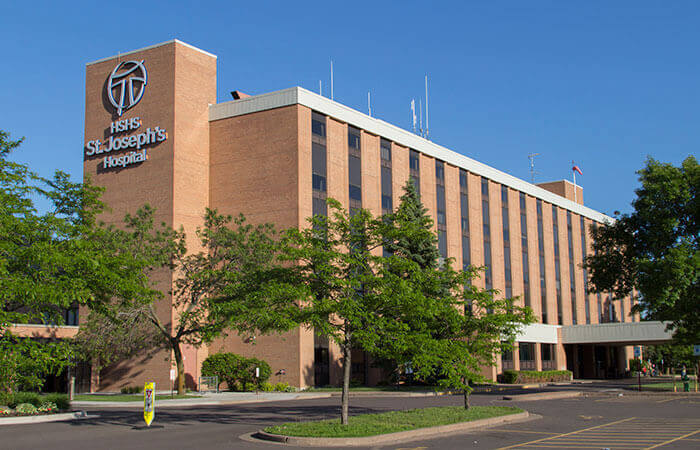Milwaukee officials are worried the closure of cardiac catheterization labs in the city will lead to worse care for victims of heart attack in the city.
Last month, Ascension Wisconsin announced a slew of changes and cuts at hospitals across southeast Wisconsin. As part of that announcement, the hospital system said it will soon close its cardiac catheterization labs at St. Joseph Hospital and St. Francis Hospital in Milwaukee.
Cardiac catheterization is a treatment for heart or blood vessel problems. People who are experiencing chest pain or heart attack symptoms will sometimes be taken to a cardiac catheterization lab, also known as a cath lab, to diagnose or treat the issue.
Stay informed on the latest news
Sign up for WPR’s email newsletter.
During a press conference last week, Milwaukee Fire Department assistant chief David Hensley said the labs are sometimes the “fastest access” for patients who have a block in their artery to get treated.
“The cath lab will go in surgically to remove that blockage, to get that tissue and the blood flowing back to their heart,” Hensley said.
Hensley said a 30-minute delay in cardiac catheterization lab access leads to 7.5 percent increase in mortality. Currently, around 95 percent of the city of Milwaukee is within a 15-minute drive of a cath lab. When the lab at St. Joseph Hospital closes on Dec. 14, that number could drop to about 78 percent, Hensley said.
“It’s going to have a negative effect … primarily on the African American population that is close to where St. Joe’s is located,” Hensley said.
Milwaukee Fire Department assistant chief Joshua Parish said it was “incredibly disturbing” to learn of the closures.
“It really poses a significant risk to increase the mortality for patients who are literally in these most critical moments,” Parish said during a Milwaukee public safety and health committee meeting.
A statement from Ascension Wisconsin said cardiac catheterization lab services in Milwaukee will “transition” to Columbia St. Mary’s in Milwaukee after the closures.
There will only be three hospitals that have a cardiac catheterization lab in the city of Milwaukee following the closures, according to the fire department. That leaves around 40 cardiac catheterization labs in Wisconsin, according to the current number of hospitals offering the service in Milwaukee and numbers from CathLab.com.
In other states across the Midwest, there are 14 cardiac catheterization labs in Iowa, 17 in Minnesota, 50 in Indiana, 60 in Michigan and 84 in Illinois, according to CathLab.com data.
On Thursday, Ascension Wisconsin CEO Daniel Jackson told members of the city’s public safety and health committee there are “multiple factors” that go into a decision to not offer services at a hospital anymore.
“As the landscape has changed, the ability or the desire to offer all services at every hospital — it’s just not practical. And with the scarcity of resources, it’s not possible,” Jackson said.
Jackson also said the hospital system had not done a study of the issue before announcing the closures, but that the decision “was based on actual experience.”
Milwaukee Alder Mark Chambers said his grandmother died of a heart attack, so the issue was especially close to him.
“Having the access to the cath lab within our community was imperative for her and other residents alike to get that fast reaction time to address the issues right away,” Chambers said during a press conference before the meeting.
The move comes as the hospital system was the victim of a cyber attack earlier this year that impacted patient records. That led to a $1.1 billion loss, according to a Yahoo Finance report.
The hospital said it can still handle some cardiac-related items at St. Joseph’s. However, Hensley said paramedics with the Milwaukee Fire Department will not take patients there anymore after the closure. He said they will instead take them to the other hospitals across the city that still have the cardiac cath labs.
“Our providers are not going to transport somebody who we think may have a need for a cardiac cath lab to St Joe’s once the service is gone,” Hensley said. “We are going to transport to a cardiac cath lab hospital, just in case they need those services.”
Wisconsin Public Radio, © Copyright 2025, Board of Regents of the University of Wisconsin System and Wisconsin Educational Communications Board.



